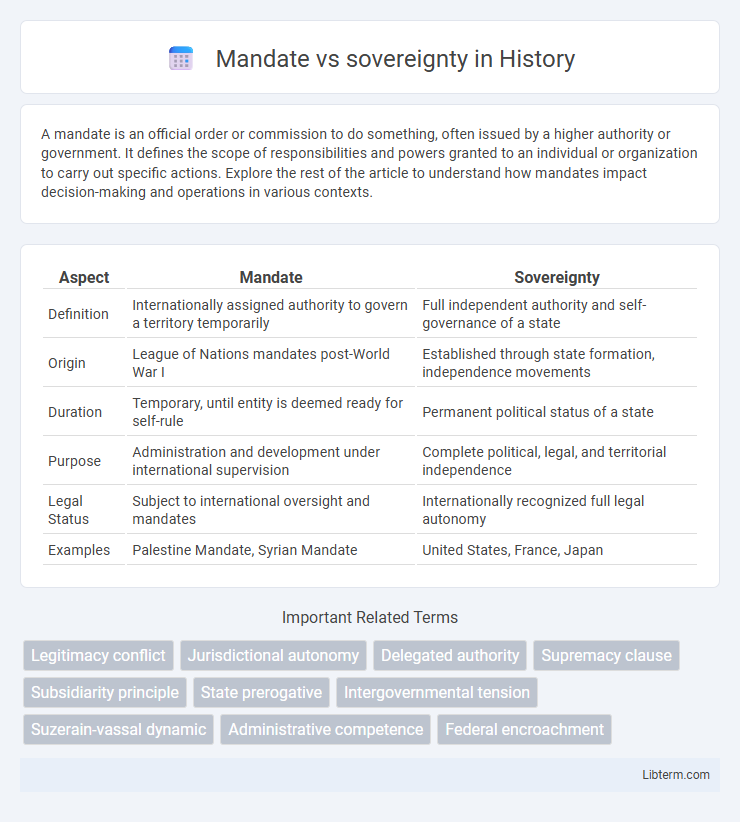A mandate is an official order or commission to do something, often issued by a higher authority or government. It defines the scope of responsibilities and powers granted to an individual or organization to carry out specific actions. Explore the rest of the article to understand how mandates impact decision-making and operations in various contexts.
Table of Comparison
| Aspect | Mandate | Sovereignty |
|---|---|---|
| Definition | Internationally assigned authority to govern a territory temporarily | Full independent authority and self-governance of a state |
| Origin | League of Nations mandates post-World War I | Established through state formation, independence movements |
| Duration | Temporary, until entity is deemed ready for self-rule | Permanent political status of a state |
| Purpose | Administration and development under international supervision | Complete political, legal, and territorial independence |
| Legal Status | Subject to international oversight and mandates | Internationally recognized full legal autonomy |
| Examples | Palestine Mandate, Syrian Mandate | United States, France, Japan |
Understanding Mandate and Sovereignty
Mandate refers to an authoritative command or instruction given by a higher power or international body, often involving the administration or governance of territories without full ownership rights. Sovereignty describes the supreme authority of a state to govern itself independently, exercising complete control over its territory, laws, and policies. Understanding the distinction reveals that mandates limit sovereignty by imposing external oversight, whereas sovereignty embodies the unchallenged power of self-rule.
Historical Context of Mandate vs Sovereignty
The historical context of mandate versus sovereignty reveals the transition from imperial control to international oversight following World War I, as seen in the League of Nations mandates that administered former Ottoman and German territories under the guise of guiding them to self-governance. Mandates were established to balance colonial administration with a promise of eventual sovereignty, often limiting the full political autonomy of the territories involved. This framework contrasted with traditional sovereignty by subordinating territorial authority to international mandates, which shaped post-war geopolitical boundaries and decolonization processes.
Legal Foundations of Sovereignty
Legal foundations of sovereignty rest on the principle that a state possesses supreme authority within its territorial boundaries, independent from external control or mandates imposed by other entities. Sovereignty is recognized in international law through treaties, customary law, and the United Nations Charter, affirming a state's right to govern itself without interference. In contrast, mandates are temporary administrative responsibilities assigned by international bodies like the League of Nations or the United Nations to govern territories until they achieve full sovereignty.
The Role of Mandates in Governance
Mandates in governance serve as authoritative directives issued by an external power or international body, compelling a state or entity to perform specific actions or uphold particular responsibilities. These mandates can limit or shape the exercise of sovereignty by imposing legal or administrative obligations that override local decision-making autonomy. The role of mandates is crucial in transitional governance, peacekeeping, and administrative control where sovereignty is shared or suspended to achieve broader political or humanitarian objectives.
International Perspectives on Sovereignty
International perspectives on sovereignty emphasize the principle of non-interference in domestic affairs, asserting that states possess supreme authority within their territorial boundaries. Mandates, established under the League of Nations and later the United Nations, represent a unique legal framework where sovereignty is limited by international obligations to promote trust, development, or administration in territories without full self-governance. This balance between mandate systems and state sovereignty reflects evolving norms in international law that seek to reconcile state autonomy with global responsibilities for human rights and development.
Case Studies: Mandates Impacting Sovereign States
Mandates imposed by international powers often reshape the political landscape of sovereign states, as seen in the post-World War I League of Nations mandates in the Middle East, where British and French control over territories like Palestine and Syria altered their paths to independence. The League of Nations mandate system transferred administrative authority without granting full sovereignty, causing tensions that led to prolonged conflicts and struggles for self-determination. Historical examples underscore how mandates can compromise state sovereignty while influencing nation-building processes and regional geopolitics.
Mandate vs Sovereignty in Modern Politics
Mandate in modern politics refers to the authority granted by the electorate or an international body to govern or implement policies, often constrained by specific instructions or conditions, whereas sovereignty denotes the absolute and independent power of a state to govern itself without external interference. Mandates can limit sovereignty when international organizations or foreign powers impose governance frameworks, as seen in post-conflict regions under UN oversight. The tension between mandate and sovereignty continues to shape debates on intervention, state autonomy, and global governance in contemporary political discourse.
Balancing Authority: Mandate or Sovereign Will?
Balancing authority between mandate and sovereignty hinges on the legitimacy derived from external authorization versus inherent national self-determination. Mandate implies governance granted by an external power or international body, often limiting full autonomous decision-making, while sovereignty embodies the absolute authority of a state to govern without external interference. The tension arises in cases where mandates challenge sovereign will, requiring negotiation to harmonize external directives with national interests and uphold political stability.
Challenges and Conflicts: Mandate and Sovereignty
Mandate systems often face significant challenges as they impose external administrative control, undermining the indigenous population's sovereignty and self-determination. Conflicts arise when mandated authorities prioritize colonial or foreign interests over local governance, resulting in resistance and disputes over legitimacy. Sovereignty struggles intensify when mandates fail to provide genuine autonomy, provoking tensions between international oversight and national independence.
The Future of Mandate and Sovereign Rights
The future of mandate and sovereign rights hinges on evolving international legal frameworks that increasingly balance state sovereignty with global governance needs. Emerging trends emphasize conditional mandates where sovereign rights are preserved but subject to international oversight in areas like human rights and environmental protection. This shift suggests a more dynamic interaction where sovereignty adapts to collective global responsibilities without entirely relinquishing state control.
Mandate Infographic

 libterm.com
libterm.com